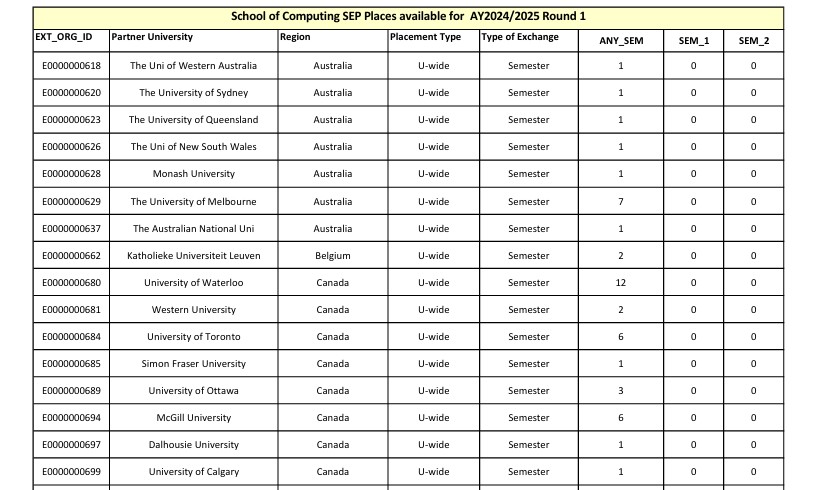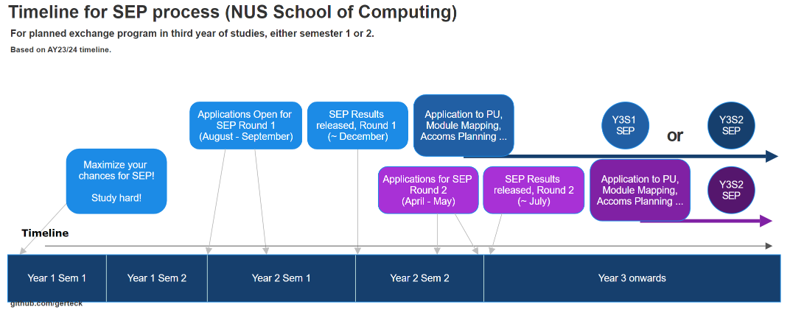An NUS exchange guide (NUS SoC CS SEP Guide)!
SEP Partner University Guide (NUS)
A Guide to Choosing your Student Exchange Programme (SEP) Partner University (PU)! (For outgoing NUS exchangers).
- your experience may vary, as each faculty within NUS handles their SEP selection process differently.
- If you’re from FASS, or Engine, the application process might (probably) not apply in the same way.
What is SEP?
SEP stands for Student Exchange Programme, and is one of the opportunities offered to students in NUS to experience living and studying in another country.
In gist, how it works:
- NUS and PU signs bilateral agreements, meaning each sends XX & YY students to each other.
- NUS nominates their XX students to study at the PU, and PU (should) accept the nomination
- NUS students pay NUS school fees while studying at PU, and converse applies to PU students.
I was quite surprised that quite a few other exchangers didn’t actually know this! Although I suppose it is not as relevant.
I doubt there is any need to sell SEP, since the benefits and appeal speak for themselves. You get to gain academic credits while experiencing life overseas. While it’s definitely not the only chance for overseas learning in NUS (see STEER, NOC, Summer/Winter Programmes, Overseas Internships), it is definitely one that is super competitive and desired by many students!
A quick search on Reddit, NUSWhispers (or whichever media you desire), would show that many have had super positive experiences with SEP. I hope that will be the same for me!
The broad categorization for PUs is based on location:
- Americas
- Asia and Australasia
- Europe, the Middle East and Africa
Application Process
Even though I have yet to go for exchange to UofT, the application process started slightly less than a year ago (roughly August 2023). Without any seniors to ask or prior knowledge, it can be quite daunting to even start the process of application and shortlisting the universities for SEP. Fret not, here’s a general guide distilled from my past pains.
Timeline
Here’s the rough timeline: (For someone who goes for SEP in year 3)
Before SEP:
- Grinding that CAP/GPA for your exchange! (Year 1)
- SEP Application opens (Year 2; Round 1: ~ August till September)
- Check your eligibility, select your PU
- Prepare your study plan, budget plan, SEP application
- SEP Results released (Round 1 release: ~ December)
- Subsequent Round 2 … Rd 2 Result Release.
After SEP Acceptance:
- Application to Host University (Year 2 S1/2; Apply to PU, dependent on PU)
- Hear back from PU regarding exchange enrollment details (again, depends on PU timeline)
- Module mapping, course bidding for PU, accoms, misc activities to find others going to same PU.
During SEP:
- Have fun! (Year 3 S1/S2)
The SEP Application PU Ranking Game
It is a well-known fact that SEP in NUS School of Computing is ultra competitive. IMO, it is a sport in itself, with a minor in mental gymnastics. There are many horror stories on Reddit of students with pre/post SU FCH cap not being able to secure a slot in SEP at all (whether true or satire). It all stems down to supply and demand, and while some argue otherwise, your allocation of PU slots is influenced by merit, which is gauged by your CAP/GPA.
Your first choice is extremely important regardless of your CAP. Here’s a good explanation of what (I think) goes down:
PSA the allocation works like modreg rounds, so your first (and second) choices are extremely important regardless of your CAP they will allocate all first choices before second etc, e.g.
- 5.0 student puts uni A then uni B
- 4.99 student puts uni A then uni B
- 4.0 student puts uni B then uni A
first choices:
- 5.0 gets uni A, 4.99 has to wait, 4.0 gets uni B
second choices:
- 4.99 doesn’t get anything as no unis are left
so if you are 4.9 CAP, it is a bad idea to put any unis that people with better cap than you will prefer in anywhere except maaaybe first choice. its a game of chicken
Note that it seems to be the case the SoC looks at both pre and post SU GPA, so just be aware.
- Old Statistics on applicants for AY2020/21 (pulled from a reddit post)
This shows an idea of the competitiveness of some of the universities among computing students
| University | Total applications | Number of 1st choices | Quota (Sem 1 and 2) |
|---|---|---|---|
| Georgia Institute of Technology | 104 | 34 | 4 |
| KTH Royal Institute of Technology | 94 | 44 | 6 |
| University of North Carolina, Chapel Hill | 93 | 15 | 10 |
| The University of Edinburgh | 91 | 31 | 5 |
| University of Toronto | 89 | 28 | 3 |
| University of Waterloo | 70 | 17 | 5 |
| The University of British Columbia | 68 | 14 | 5 |
| McGill University | 67 | 19 | 3 |
| Boston University | 58 | 12 | 4 |
| Technical University of Denmark | 56 | 16 | 3 |
| King’s College London | 50 | 11 | 6 |
| University of Southern California | 38 | 7 | 2 |
| ETH Zurich | 24 | 2 | 6 |
I don’t think the statistics were released in my year of application, but I think that the numbers are a decent representation of what to expect. It can be hard to gauge and hence play the Ranking game, but here are some considerations:
- Competitiveness of a University are influenced by:
- Location, Language, Brand, ability to map SoC mods, your SoC cohort etc.
- In general, Canadian & UK universities have the highest bar of entry for SEP.
- Some places are just hotspots for SEP because of things to do, weather, culture, travel opportunities, etc. Europe is competitive because if you can afford it, you can literally visit most of the major European cities every weekend or so.
- Some other PU such as in Germany operate on an odd semester + German language for most mods, making it hard to go for exchange without special arrangements (pairing with ATAP etc.) Since these might be less competitive, it might be a play to apply for them if you aren’t confident in your GPA.
If you really want to go to competitive places like Europe or North America, then you should look for a university that is obscure enough. Another way is to find an obscure uni and also a uni that has a limited but feasible CS department with enough modules available for mapping. Module availability is a big factor for SEP applicants, so if you are willing to sacrifice that, it can be a huge play.
- Pointers Based on the email sent out to SoC on SEP:
It’s crucial for students to understand that the SEP application process in the School of Computing (SoC) is highly competitive. Many students may only be allocated their fifth choice of partner university due to the limited number of places available. Should the SEP spot is heavily oversubscribed, we will only consider first choice selection.
- This means that only your first choice selection may be considered, so you need to choose wisely.
- It’s game theory. You have to determine the best strategy and look ahead to every possible outcome.
- For me, I did up a simple spreadsheet with my selection conditions in order to determine the risk vs. benefit to optimize my 5 PU choices. I had applied with a close friend of mine, so I took into consideration the quota (quota of 2 was a no for me), competitiveness, mapping of CS3230 etc to analyze the risk vs. benefit of each choice.
- If you want to play it safe, consider applying for less popular universities that may not have optimal previous course mappings, and do your own research. There are cases where many CS courses can actually be mapped for these PUs that simply weren’t done before.
Other Notes
Study Plan
It is mandatory for you to complete and submit a Study plan for your SEP application and answer the SEP related questions in your application. Failing to do so will result in an incomplete application, and your submission will be voided. Please note that there won’t be any reminders for missing documents, so make sure to include the study plan. Email submissions for supporting documents are not accepted.
SEP vs NOC
Please note that EduRec doesn’t allow applications/offers with overlapping semesters. Thus, if you are planning/ have applied for NOC or any other exchange programe, you would not be able to apply for SEP (vice versa). Thus, please consider carefully before submitting your application.
NUS Scholarship If you have an NUS scholarship that guarantees a SEP slot, it doesn’t affect this meritocratic process. Nu-uh. From what I understand, you simply get an additional round 1b before round 2, which is just the leftover from round 1. After all, it does not promise your SEP PU, simply a slot.
There are some other misc. things such as having to complete some Overseas Travel Preparedness e-course and some International SOS setup, but those should be relatively simple and fuss free.
Helpful Resources you might find helpful:
General Resources
NUS SEP Website link
Website has everything you need to get started!
- Timeline, Prep, FAQs, Testimonials, Financial Assist. available etc.
Related to choosing your PU:
Past Years’ Global Relations Office (GRO) SEP reports! link, requires NUS email login
This sharepoint has all the past SEP reports contributed by returning exchangers that serve as a useful reference for students who are planning to go on exchange. This includes things such as
- Study / Learning culture experienced at PU
- Courses Mapped
- Accommodation situation
- SEP Activities, Cost of Living, Challenges
- Overall Reflection
- Suggestions for future exchangers
This link is hidden in some obscure spot on the NUS SEP website, and it isn’t surprising that most of the people I’ve spoken to don’t even know this resource exists. But big kudos to the GRO, I believe this is the singular most useful resource in helping pick a the PU that you want if I had to pick one.
Related to Module Mapping:
NUS Computing Course Mapping Guidelines link
In particular:
- Courses mappable only if at least 70% similiarity between courses
- Submit via myEduRec > Academics > Global Education > Submit Course Mapping
- Research PU’s course components, contact hours, grade breakdown and assignment weightages, as it is needed for the mapping.
- Provide grades for the prerequisites for your NUS mapping
- No specific deadline for mapping submissions, but it does not hurt to be early!
From my experience, although it is specified that the processing time is at least three weeks or more on the website, I’ve had course mappings approved within 30 minutes of submission. Maybe SoC is just that efficient.
I will keep this post updated if I get any more useful tips!
End
Thanks for reading till the end! If you found this useful, do check out my collection of cheatsheets on GitHub, and drop a star if you find it useful as well! Or feel free to drop a follow too!


